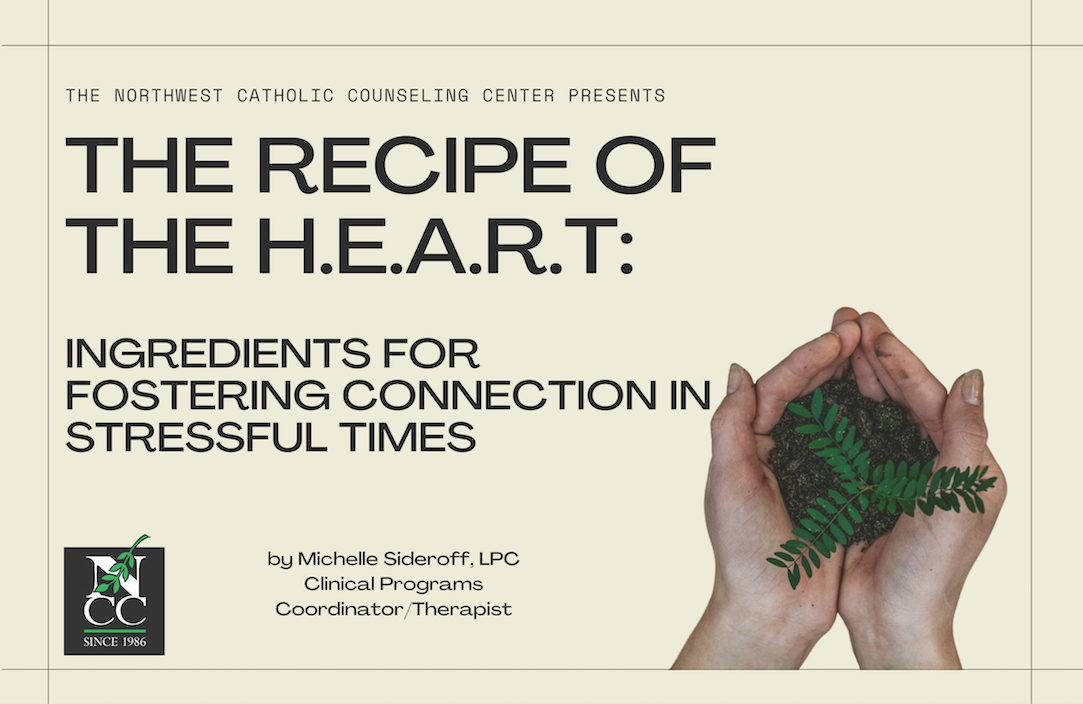February 25, 2022
When we think of love and romance, we are vulnerable to envisioning the fairy tale theme of “happily ever after” coming after the weary journey of finding love. From our childhood tales of Cinderella, Beauty & the Beast, Snow White, and others, we have been socialized to use these storyboards for love despite the significant red flags or lack of a story past marriage or initial commitment. Our modern stories on relationships are usually about how love started or how it ended, with very little representation of love in the midst of living.
Now, as we have entered another year fighting the trauma of Covid-19, our relationships have continued to experience immense amounts of chronic stress and the impacts may have some questioning the meaning, quality, and love in their relationships. Despite the inability to avoid adversity in our lives and relationships, it is common and normal to feel unprepared and lost. It is not hopeless, though! There are ingredients we can use to help maintain our connections. Our relationships do not naturally sustain themselves, but rely on us to nurture relational resilience. Let’s explore the recipe of the H.E.A.R.T to identify ways to help sustain love and connection while in the midst of chronic stress.
HOPE
Hope is an important protective factor both for individuals and their relationships. Research finds that hope is connected to life satisfaction and is a buffer against the negative impacts of stressful life events. Hopeful individuals possess positive thinking that is reflective of a realistic sense of perspective and optimism in their ability to act. Hopeful individuals hold a belief that they will move forward. Hope can exist even in the face of any and all hardships.
It is clear to see the importance of hope and it is not a simple ingredient to make in our recipe for connection. Hope can be created with the practice of intentionally identifying qualities you like in your partner. The practice of realistically seeing the light and dark sides to a stressful situation or that the cup is both half-filled and half-empty. Developing an understanding of the roadblocks or stressors you are facing along with identifying strategies to target them can help build trust in the ability to overcome. We need to believe that the recipe is going to work and that the evolving product will add to our lives.
Emotional Regulation
The emotions will make quite a batter when they have been whipped up with stress and we often take out our emotions on the ones that are closest to us. Our ability to be connected and regulate our emotional states will help us personally move through our challenges and can help us have less ruptures in our relationships. Finding tools and outlets to manage our emotional states will help keep the lid on the blender as our stressors can create quite a stir. Emotions are natural and are feedback for what we are experiencing and the purpose of this ingredient is management, not restriction.
Our emotions exist in our body and so our body becomes the path we need to take to care for it. A tool that helps regulate our bodies and helps us manage our emotions is meeting the body’s basic needs of food, rest, liquids, and temperature. Hanger is a word created with this in mind and highlights when our body has an unmet need that we are vulnerable to escalate. Another critical tool that is quick to access is using sensory interruptions. Oftentimes when we are dysregulated, we are in the past or the future. Sensory sensations of touching soft or rough surfaces, smelling favorite scents, hearing music, or looking at your favorite picture helps bring the body to the present moment. When we enter a place of grounding with body security with met needs and grounded in the present moment, our brain will have access to its thinking parts to help us move toward processing and identifying strategies to the stressors or factors influencing our emotions.
Acceptance
Not every recipe with the same or very similar ingredients is going to have the same flavor or come out looking the same way. Chronic stress, such as the case with the pandemic, can make it harder to pull enough of the ingredients together or require more effort to work through a challenge. When we put pressure on ourselves or our partners to be a certain way or that the outcome needs to be the same as it was pre-stressor, we set up a mindset that is going to produce resentment. Resentment on top of stress can be lethal for a relationship.
Acceptance is coming to terms and working with the present conditions, not past states or future potentials. Acceptance is building a mindset of awareness about current strengths and limitations in each other and the stressful conditions that are operating. Coming to terms with the interplay will help a relationship make decisions on reality versus expectation. When we are grounded in our bodies and grounded in the conditions of our relationships, we will be more successful in accessing needed resources, identifying strategies to put into place, and when we need to outsource support. Accepting ourselves in our limitations will enable us to know when we need to use vulnerability to communicate with our loved ones for support or when we may need to set a limit that we cannot be a support for others. Limitations are not a measure of love, they are a condition of capacity and availability.
Reciprocity
Equal is not always fair. We put a lot of pressure in relationships with being equal versus looking at each other’s starting point, abilities, resources, or skill sets. Whether in chronic stress or not, not every facet of the relationship is going to be 50/50. Relationships help us when they are reciprocal and have a level of balance to them. Reciprocity is the practice of exchanging things with others for mutual benefit. The key points being mutual and benefit and each relationship has the power to define how that is going to operate at any given moment. We are powerless to the stressors, we have power on how we navigate through the stressors.
A reciprocal relationship will look at highlighting the strengths of each individual in the exchanges of care and love. For instance, the partner highly skilled in cooking may decide to cook the meals where the other partner will wash the dishes. Each partner may have their own preferred love language and will learn each other’s dominant love language to support the bi-directional exchange of love. Reciprocity in love languages includes accepting actions of love and care in other forms that may not be preferred.
Thankfulness
Expressing thanks in our relationship can go a long way. When we become lost in the shuffle of work, parenting, juggling responsibilities, or the many other roles in life, we can lose sight of the greatness in our relationships. Research highlights how the practice of gratitude nurtures resilience in times of transition and adversity, increases feelings of happiness, helps us relish experiences, and builds stronger relationships. Identifying what we can be thankful for helps us hold onto hope by highlighting the positive things and reminding us that our loved ones are helpful and/or supportive. Individuals that take the time to express gratitude not only feel more positive toward the other person, but are found to feel more comfortable expressing concerns and vulnerability in their relationships.
Expressions of gratitude can be part of a daily practice or established routine. A couple can exchange moments of appreciation or thanks to each other during meals or shared activities. The gesture of writing a note or card for your loved one expressing thanks or admiration. Couples or families can create gratitude or kudos Jar to highlight thanks. Giving thanks can also be a reflective activity where some may enjoy a gratitude meditation or a journaling prompt to boost connections to things or people that help us feel better. Thankfulness toward oneself is also essential as we matter and can learn to appreciate things we do that are hard and boost our self-esteem.
H.E.A.R.T is an Unfolding Recipe
The baking tools and quality of ingredients we use can impact the recipes of our heart. The ingredients mentioned above are not all the ingredients that are needed to make a healthy and lasting relationship, but are important areas to explore and build upon to help increase healthy connections with our loved ones. These relationship ingredients can help us keep our relationships strong or buffer the impact of stressors on them. Recipes are meant to evolve and so there will be times when emotional regulation needs to be the focus and other situations when the practice of acceptance is the critical leavening agent in the baking of connection. Our love stories are not merely Happily Ever After, but can be Resilient Ever After.
-Michelle Sideroff, LPC





